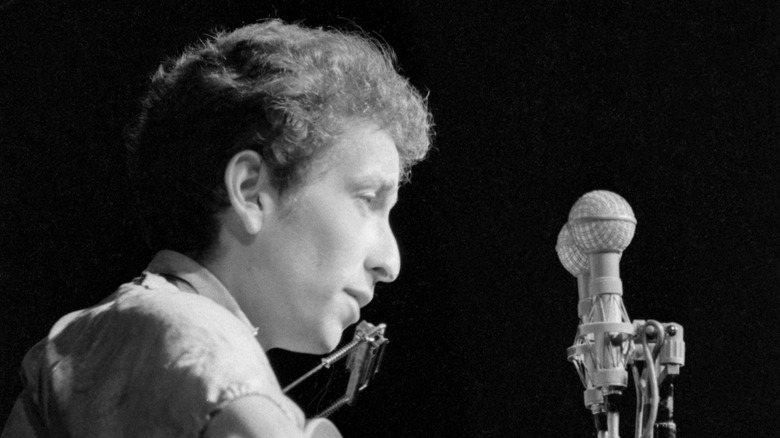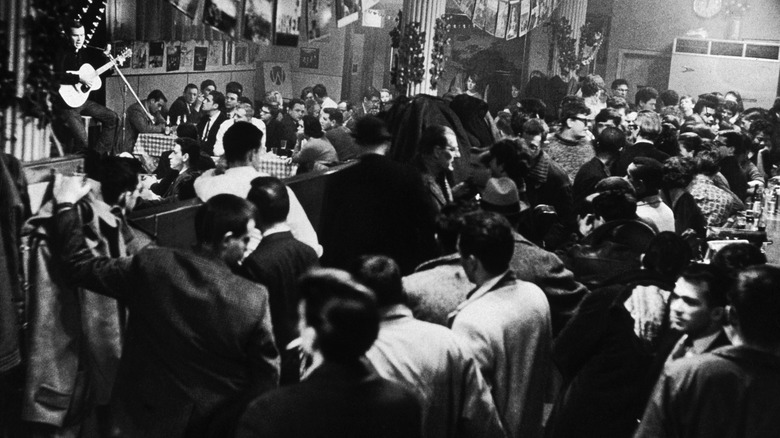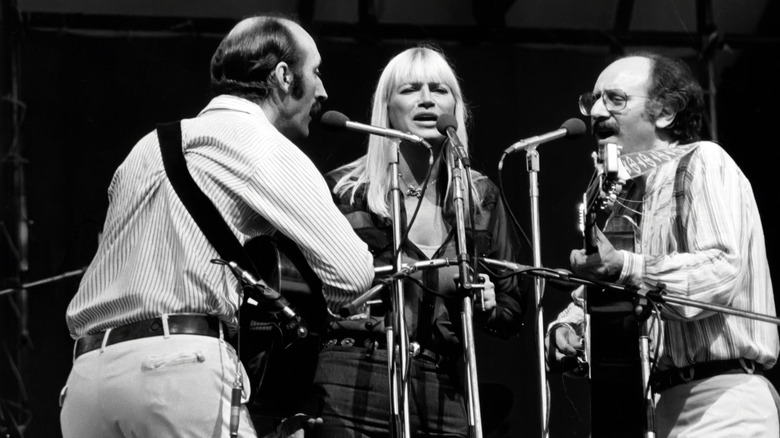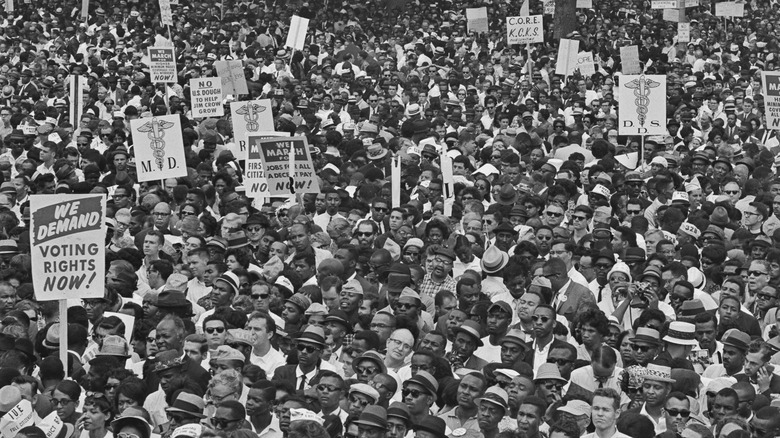The Real Meaning Behind Blowin' In The Wind
Bob Dylan came running into Gerde's Folk City, a Greenwich Village music venue, and found his friend and fellow musician, Gil Turner, who was about to go on stage with the New World Singers. "Gil, I got a new song that I just finished," Dylan said, according to "Revolution in the Air: The Songs of Bob Dylan, 1957-1973." "Wanna hear it?" It was April 1962, and the song was "Blowin' in the Wind." It was a departure from Dylan's previous songwriting output. His debut album only had two original songs, per American Songwriter, and neither had the same depth as this new tune. Turner was blown away by "Blowin' in the Wind." He sang the song — that was destined to change Dylan's life — that night in what would be its first performance before a live audience. The crowd had the same reaction as Turner when he first heard it. They were awed.
That summer, in an interview with the folk music magazine, Sing Out!, Dylan tried to explain the meaning of the song's lyrics. "There ain't too much I can say about this song except that the answer is blowing in the wind," he said, per "Revolution in the Air." "It ain't in no book or movie or TV show or discussion group."
Origins
Bob Dylan wrote "Blowin' in the Wind" in two short stints in April 1962. He later claimed he composed the original two-verse version in about 10 minutes, with the middle verse coming a few weeks later. Bob Cohen of the New World Singers told RightWingBob.com the tune was based on a traditional spiritual — "No More Auction Block For Me" — that the group included in their repertoire.
When Dylan debuted the original two-verse version at Gerde's Folk City that month, he started out by trying to explain what the song wasn't about. "This here ain't a protest song or anything like that, 'cause I don't write protest songs," he said, per "Revolution in the Air." "I'm just writing it as something to be said, for somebody, by somebody." Yet, in the Sing Out! Interview, he said that "some of the biggest criminals are those that turn their heads away when they see wrong and know it's wrong. I'm only 21 and I know there's been too many wars."
Peter, Paul, and Mary
Even before Bob Dylan or anyone else had recorded "Blowin' in the Wind," Gil Turner and the folk legend Pete Seeger published the song's lyrics in their magazine Broadside, and it soon took on a life of its own. The folk singer Dave Van Ronk, who initially dismissed the song, heard street singers around Washington Square Park in Greenwich Village parodying "Blowin' in the Wind." "If the song is strong enough, without even having been recorded, to start generating parodies, the song is stronger than I realized," Van Ronk recalled in "Down the Highway: The Life of Bob Dylan."
With "Blowin' in the Wind," Bob Dylan was about to supercharge his career and catapult himself into the category of a voice of his generation. But it wasn't his version that made it happen. Peter, Paul, and Mary, a popular folk trio, recorded the song in the summer of 1963, with their version shooting to the No. 2 spot on the Hot 100, giving Dylan a huge boost, per the Los Angeles Times. Dylan included the song on his second album, "The Freewheelin' Bob Dylan," which helped propel his album into the Top 25.
Protest song
Whether he intended it or not, "Blowin' in the Wind" quickly became a protest song. "We would go on to sing it in Mississippi in 1963-64 where it became a civil-rights anthem," Bob Cohen recalled on RightWingBob.com. Cohen felt the song "reflected that yearning for justice and for peace. That the answers are blowing or blown in the wind."
The highwater mark of "Blowin' in the Wind" as a protest song came in August 1963 during the March on Washington for Jobs and Freedom — the same iconic event where the Rev. Martin Luther King gave his famous "I Have a Dream" speech. Peter, Paul, and Mary performed the song on the steps of the Lincoln Memorial after being introduced to a crowd of more than 250,000 people by the actor and activist Ossie Davis. "And now, a group of singers who have come to help express in song what this great meeting is all about," Davis said by way of introduction before the trio launched into Dylan's song (via YouTube). Even so, Dylan continued to deny any political meaning in his tune. "I'm not politically inclined," he told a reporter (via "Revolution in the Air"). "'Blowin' in the Wind' was just a feeling I felt because I felt that way."



